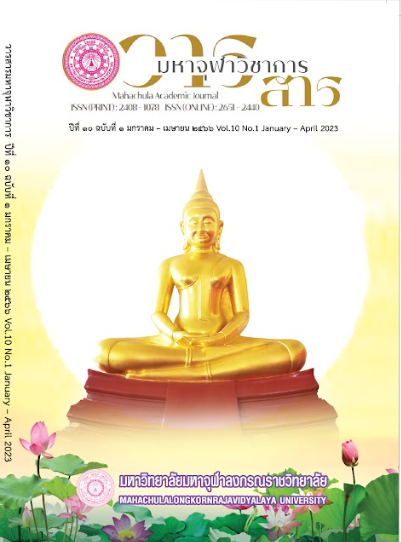Self-Development for Happiness Based on Buddhist Society
Main Article Content
Abstract
The academic article Aim to explaining self-development for happiness in the context of Buddhist. Everyone wants to be happy, yet everyone has a different attitude and viewpoint on happiness. As a result, it is necessary to develop myself gradually, beginning with self-development for a life that is full of happiness, morality, and justice. To develop myself to be happy, one must be aware and begin learning from the first step, which is to conduct good deeds. Self-development in Buddhism or in the context of Buddhist consists of four principles which are kāya-bhāvanā (physical development), sīla-bhāvanā (moral development), citta-bhāvanā (emotional development, and paññā-bhāvanā (wisdom development). Self-development has three objectives including: (1) diṭṭhadhammikattha refers to benefits obtainable here and now or the good to be won in this life; (2) samparāyikattha refers to the good to come in the future, life and mental values, and just behavior, all of which culminate in profound self-assurance; and (3) paramattha refers to the highest goal or Nibbāna. Self-development for happiness based on Buddhist society has an impact on both individual and society so that people can apply to develop themselves and to gain true happiness. Happiness, according to Buddhism, can occur without changing life's goals as happiness is in the mind, and since happiness is what counts in life, it is important to live life happily, to be in the present moment, to practice letting go of the mind, and to use Buddhist teachings as a guide to achieve desire, happiness, and success in life for oneself, others, and society.
Article Details

This work is licensed under a Creative Commons Attribution-NonCommercial-NoDerivatives 4.0 International License.
References
เกสร มุ้ยจีน. การสร้างความสุขด้วยจิตวิทยาเชิงบวก. วารสารวิทยาศาสตร์ และเทคโนโลยี. ปีที่ ๒๔ ฉบับที่ ๔ (ตุลาคม -ธันวาคม ๒๕๕๙) : ๖๗๓.
พระพรหมคุณาภรณ์ (ป. อ. ประยุทธ์ ปยุตฺโต). ทางสายกลางของการศึกษาไทย. กรุงเทพมหานคร: คณะศึกษาศาสตร์ มหาวิทยาลัยเกษตรศาสตร์, ๒๕๓๑.
ไพศาล ไกรสิทธิ์. การพัฒนาตน. ราชบุรี: สถาบันราชภัฏหมู่บ้านจอมบึง, ๒๕๔๒.
มหาวิทยาลัยมหาจุฬาลงกรณราชวิทยาลัย. พระไตรปิฎก ฉบับมหาจุฬาลงกรณราชวิทยาลัย. กรุงเทพมหานคร: โรงพิมพ์มหาจุฬาลงกรณราชวิทยาลัย, ๒๕๓๙.
เมธาวี อุดมธรรมมานุภาพ และคณะ. พฤติกรรมมนุษย์กับการพัฒนาตน. กรุงเทพมหานคร: ศูนย์หนังสือสถาบันราชภัฎสวนดุสิต, ๒๕๕๑.
รัชนี รัตนะ. ความต้องการในการพัฒนาตนเองของผู้ใหญ่บ้านในพื้นที่อำเภอหนองใหญ่ อำเภอบ่อทองและอำเภอบ้านบึงจังหวัดชลบุรีทหารบก. ชลบุรี: มหาวิทยาลัยบูรพา, ๒๕๕๑.
ฤกษ์ชัย คุณูปการ และคณะ. พฤติกรรมมนุษย์กับการพัฒนาตน. กรุงเทพมหานคร: สำนักงานสภาสถาบันราชภัฏ, ๒๕๔๖.
วินัย เพชรช่วย. พฤติกรรมมนุษย์กับการพัฒนาตน. กรุงเทพมหานคร: สถาบันราชภัฏสวนสุนันทา, ๒๕๕๑.
สมใจ ลักษณะ. การพัฒนาประสิทธิภาพในการทำงาน. พิมพ์ครั้งที่ ๕. กรุงเทพมหานคร: เพิ่มทรัพย์การพิมพ์, ๒๕๔๙.
เอกสิทธิ์ สนามทอง. การพัฒนาหลักสูตรฝึกอบรมเพื่อพัฒนาฉันทะทางการเรียนของนักศึกษาสถาบันอุดมศึกษาเอกชนในเขตกรุงเทพมหานคร. กรุงเทพมหานคร: มหาวิทยาลัยรามคำแหง, ๒๕๕๒.
Ebookserenity. หลักการพัฒนาตน ๔ ประการ เพื่อความก้าวหน้าของชีวิต. [ออนไลน์]. แหล่งที่มา: https://shorturl.asia/Uh4ST [December 23, 2019].


